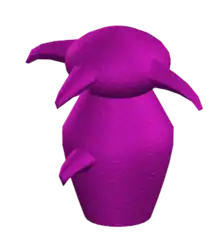greeble
English

A greeble (invented novel object used as a stimulus in psychology).
Etymology
- A neologism that was originally coined and used by the prop-makers from Industrial Light & Magic while working on production of the original Star Wars film. (This etymology is missing or incomplete. Please add to it, or discuss it at the Etymology scriptorium.)
- The objects in psychology were named by the American psychologist Robert Abelson.
Pronunciation
- IPA(key): /ˈɡɹiːbliː/
Audio (US) (file) - Hyphenation: gree‧ble
Noun
greeble (plural greebles)
- A small piece of detailing added to break up the surface of an object and add visual interest, particularly in movie special effects.
- Synonym: nurnie
- (psychology) Any of a set of invented novel objects used as stimuli in psychological studies of object and face recognition.
- 2005, Hugh W. Catts, Alan G. Kamhi, The Connections Between Language and Reading Disabilities, page 93:
- Because, compared to other objects, face recognition seems to be especially sensitive to stimulus orientation, Gauthier had subjects perform a matching task with upright or inverted faces and greebles in the scanner, hypothesizing that greeble expertise would be specific to viewing them in the trained, upright orientation.
Translations
A small piece of detailing added to break up the surface of an object
Verb
greeble (third-person singular simple present greebles, present participle greebling, simple past and past participle greebled)
- (transitive) To add greebles to a surface.
- We're going to greeble the surface of the model to give it a more convincing look.
Further reading
 greeble on Wikipedia.Wikipedia
greeble on Wikipedia.Wikipedia  greeble (psychology) on Wikipedia.Wikipedia
greeble (psychology) on Wikipedia.Wikipedia
This article is issued from Wiktionary. The text is licensed under Creative Commons - Attribution - Sharealike. Additional terms may apply for the media files.